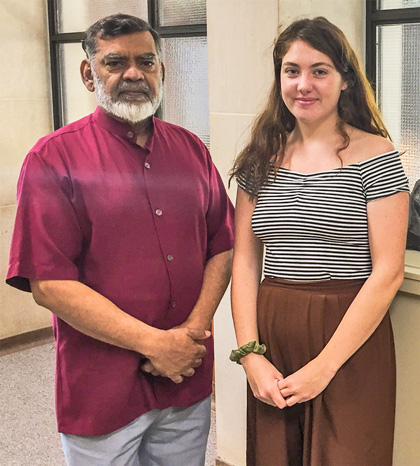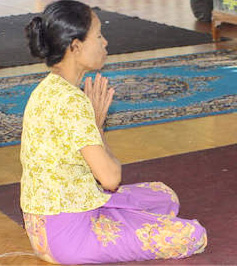| October 3, 2018 issue | |
Community Connection |
|
| Prominent community couples – Panwars, Deonarains – recognized at the 2018 TAS/VCC Award Ceremony | |
By Adit Kumar Toronto Arya Samaj/Vedic Cultural Centre (TAS/VCC) recognized two deserving couples this year at its annual awards presentation and dinner held on Saturday, September 22, 2018 at its banquet hall at 4345-14th Avenue, Markham. They are Randy and Juliette Deonarain and Hemant and Vaishali Panwar. Both couples are well known in the community and have been recognized for their generous support to the community. Juliette and Randy, who hail from Guyana, are “people who care enough to dedicate their limited personal time and financial resources to help the underprivileged and disenfranchised poor and also to be civic-minded for the better good of the wider community needs” as noted by their presenter, Cliff Rajkumar. “They can always be relied upon to respond, promote and support worthwhile and uplifting humanitarian and societal causes”, Cliff also observed. Both Juliette and Randy came from humble beginnings and through hard work, dedication and entrepreneurial excellence they were able to develop a thriving roofing business. Despite their financial successes they remain rooted to the ground and many have benefited from their generosity as they shared their wealth to many deserving causes. Vaishali and Hemant are highly accomplished Kathak dancers of Jaipur Gharana who have been working together for more than twenty years. Since coming to Canada in 2005, they have been engaged in teaching and promoting the dance form and have mesmerised audiences across the country with their grace, artistry and creativity. The couple went to Guyana in 2002 under the auspices of the Indian Council for Cultural Relations (ICCR), to teach music and dance. They spent three and a half years there where they taught dance and vocal music at the Indian Cultural Centre in Georgetown. Their stay in Guyana provided them with the backdrop for one of their major productions – Hesperus 1838 – which told the story of Indian Indentured labourers coming to Guyana. The Vedic Cultural Centre South Asian Heritage Committee had engaged them to do this production in 2013 as part of the 175th anniversary of Indian Arrival in Guyana. The Panwars have also produced and enacted Shakuntala and Krishna which have also won accolades wherever they were performed. They are currently working on other projects including Raam Leela. Frank Scarpitti, Mayor of Markham, was among the dignitaries who graced the occasion. He thanked the recipients for their contribution to the community and pointed out that “it is a greater honour to be recognized by one's own community”. The Mayor also presented recognition plaques to the awardees on behalf of the City of Markham. Mr Scarpitti thanked the volunteers and leaders of Toronto Arya Samaj/Vedic Cultural Centre for their efforts in running their Organization and Cultural Centre and preserving their cultural heritage. He reminded the audience that multicultural Canada invites them all to retain their cultural heritage as they migrate to Canada. The event was well attended and many past award recipients were also present including Councillor, Jim Karygiannis, who also spoke and gave credit to the new awardees. Norma Jainarine and Sharada Bhajan co-emceed the program. President of Toronto Arya Samaj, Anand Rupnarain also assisted in the presentation of the program. The awards presentation and dinner is a major event in the calendar of Toronto Arya Samaj. It recognizes individuals for their outstanding achievements, contribution or service to the community. It is also one of the organization's major fund raising activities. Panwar Music and Dance will be performing the dance drama “Krishna” at the Toronto Arya Samaj Annual Diwali Concert to be held on Saturday, November 10, 2018 starting at 6:30pm in the concert hall at 4345-14th Avenue, Markham. For more information contact this writer at 647-866-1926 or Sharada Bhajan at 416-450-1743. |
|
| 'Kal Ho No Ho' raises over $31K towards Doobay Medical & Dialysis Center in Guyana | |
On Saturday September 15, 2018 hardworking members of the Laxmi Sabha of Vishnu Mandir and others organized a fundraising musical evening – Kal Ho Na Ho - in support of the Doobay Medical and Dialysis Center in Guyana. |
|
| Diversity in Canada has the capacity to inspire the world | |
 |
Olga Stachova is the CEO of the Multilingual Orientation Service Association for Immigrant Communities (MOSAIC) |
It’s a time of reckoning for Canada’s commitment to diversity and inclusion as a new poll shows that many among us want to see the number of immigrants coming into our country lowered. According to the Angus Reid Institute, 49 per cent of surveyed Canadians want to see the federal government's 2018 target of 310,000 immigrants reduced. This statistic is both startling and revealing because this is the first time since Justin Trudeau became prime minister that such a large number of Canadians are saying there should be fewer immigrants to Canada. The Liberal government under Prime Minister Trudeau has raised the target for new permanent residents from approximately 250,000 under the Conservative government of former Prime Minister Stephen Harper. The target for 2017 was 300,000, rising to 310,000 for this year and increasing incrementally in the coming years to 340,000 in 2020. Extrapolate this poll finding and you will find a troubling consensus building across the political spectrum; past Conservative voters are most critical of immigration levels, past Liberal supporters are four times more likely to prefer a reduction to an increase, as are past NDP voters. What is even more of a concern is that Canadians seem to be shying away from providing hope and a safe haven for the world’s most vulnerable. While the global refugee crisis exacerbates and the need for humanitarian aid increases, a significant number want to see Canada’s helping hand pull back. |
|
 |
|
Conversely and encouragingly, the other half of Canadians say we should accept more refugees and humanitarian class immigrants, or at least maintain the current levels. While the politics of hate and division continue to be fuelled by the current leadership of our southern neighbour and by the far-right movements in Europe, it is imperative for our political leaders to continue being strong custodians of Canada’s pluralistic identity. This new poll shows a fraying of our commitment to diversity and inclusion. It is also a clarion call that we cannot take diversity and inclusion for granted. If we want to continue to stand out as a beacon of pluralistic values, we need to find out why an increasing number of Canadians want to shut the door on newcomers. At the same time, we need to empower the other half of Canadians whose thoughts, word and actions personify that diversity is Canada’s main strength. If we help Canadians consider perspectives other than their own and encourage civil debate, it will broaden the basis for critical thought and promote cultural understanding. It will also bring attention to Canadian competencies that have helped remove racial-tensions, barriers to entry into the job market and the development of policies on integration, immigration and acceptance of refugees. Our pluralistic values didn’t happen by accident, and won’t continue without concerted and increased efforts to showcase civility over divisiveness, compassion over tolerance and love over hatred. That will illustrate that Canadians cherish the fact that the strength of any majority is how it treats its established minorities and newcomers. And it will ultimately show that diversity in Canada has the capacity to inspire the world. |
|
| Adrianna Michell selected as initial recipient of McMaster University MG Scholarship |
|
 |
|
| Adrianna Michell with Ramnarine Sahadeo | |
| Established one year ago under the instance of Ramnarine Sahadeo, the initial McMaster University Mahatma Gandhi Scholarship will be awarded to Adrianna Michell, according to a communication from Deanna Tigani, Senior Development Officer of the University. |
|
| Commitment to diversity must include room for faith |
|
 |
Ray Pennings is Executive Vice-president of the think-tank Cardus. |
Depending on political preference, most Canadians would likely agree that diversity is our strength or is a product of our strength. Regardless of the preferred permutation, those views recognize diversity as a central feature of Canadian society. That’s all well and good, but what does that commitment to diversity really mean? A quick scan of the news for the last few months reveals what Canada’s governments, sports officials and corporations mean by diversity. Governments have trumpeted their appointment of racial minorities and women as judges. Cities and universities have created Pride crosswalks. And Ontario Hockey League players are sitting through pre-season gender expression workshops. While all of those touch on diversity, there seems to be precious little acknowledgment of a different aspect of it: faith and religion. If we’re genuinely committed to Canada’s diversity, we have to consider religion in a substantial way. According to the federal Immigration Department’s latest plan, Canada hopes to welcome almost a million newcomers by the end of 2020. Meanwhile, the latest polling by the Angus Reid Institute finds that Canada’s faith communities get a big boost from immigration, which both sculpts and sustains Canada’s diversity. Almost four in 10 first-generation immigrants are “religiously committed” – most likely to attend church or another house of worship, read scriptures and pray regularly. That’s almost double the proportion of the average Canadian population in the same category. |
|
 |
|
And we know from Statistics Canada that the main source of our immigrants is now Asia, not Europe. We also know that four in 10 immigrants arriving here between 2001 and 2011 identified as Christian, equal in proportion to those who identified with another religion. Meanwhile, the proportion of those unaffiliated with any religion has not strayed far from 20 per cent since 1971. In other words, immigration (including many visible minorities) is helping to boost religious commitment in Canada, both Christian and non-Christian. That reinforces the thesis of Reginald Bibby and Angus Reid in their 2016 book Canada’s Catholics. They argue that while the voices of secularism have grown bolder and louder over the last decades, and society has become more polarized on the subject of religion, religious faith remains important in Canadian life. That’s because groups “like Catholics, Muslims, and evangelicals are experiencing a tremendous influx of people.” This means that Canada’s commitment to diversity must have room for faith communities. So should secularism reign supreme by creating some sort of neutral ground by keeping faith and religion private? No, suppressing religious expression is not neutral. Immigrants to Canada know this. That’s likely why two-thirds of them say religion’s overall impact in the world is positive, according to the latest Angus Reid poll. And 64 percent of immigrants want to see religious and faith communities influencing Canadian public life. Neither can our approach to religious diversity be a superficial acknowledgment of different traditions without an actual bearing on real life. It’s nice of politicians to acknowledge Ramadan, Easter, and Diwali on Twitter. But faith entails a lot more than holidays and special foods. Cardus has long argued that true commitment to diversity must acknowledge that communities and individuals of faith hold many beliefs quite deeply. There are sincere and profound disagreements among faith communities about fundamental issues. Their deeply held beliefs can also clash with broader North American culture or with the other aspects of diversity that have, to date, captured the attention of governments, corporations, and sports leagues. It almost seems like a truism, but perhaps one of the most important aspects of religious diversity in Canada is that disagreement is okay. True diversity acknowledges that we do think differently from one another and that we’re free to express those differences. Publicly. As a consequence, we won’t pretend all beliefs are equal. Neither will we shun those whose beliefs clash with our own. Instead, we’ll debate and engage each other. We’ll exchange ideas. At a bare minimum, we’ll leave room for disagreement. Unfortunately, that doesn’t happen often enough in Canada. Here’s a very recent example: the controversial Canada Summer Jobs program attestation. Which communities did the federal government disproportionately hurt by insisting that grant applicants accept the government’s view on abortion or LGBTQ+ issues? Religious and faith communities – one of the most racially and ethnically diverse parts of Canadian society, according to Angus Reid polling. Ironically, the attestation ended up harming diversity instead of celebrating it. We can do better than this in Canada. If diversity is our strength – or a product of our strength – we must. |
|
 |
|
 |
|
| < In The News | |